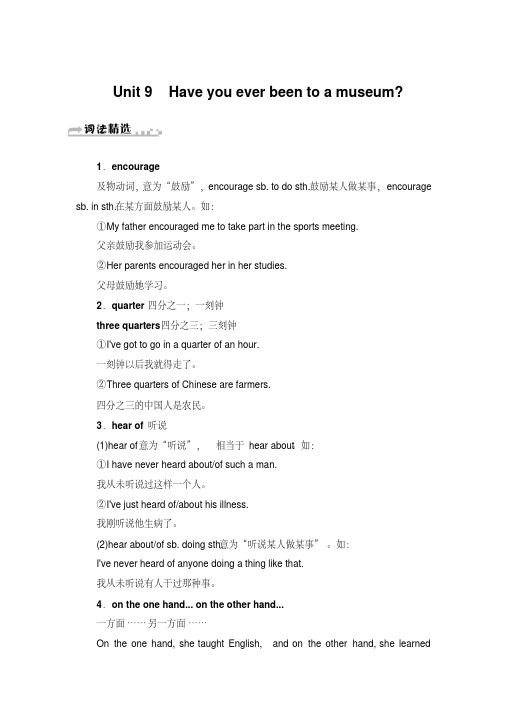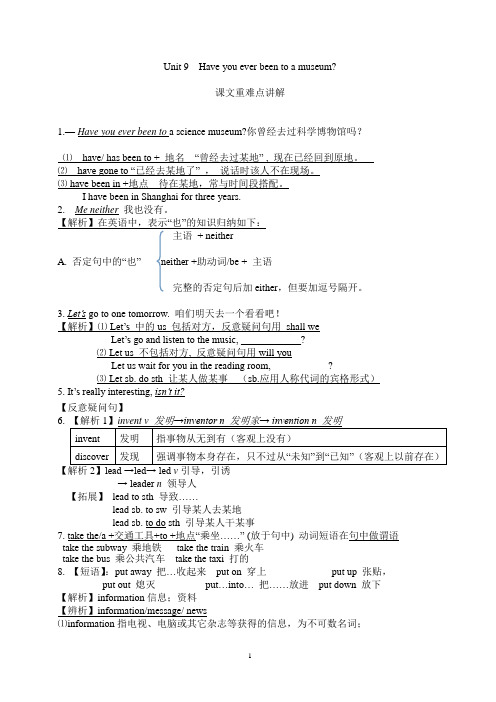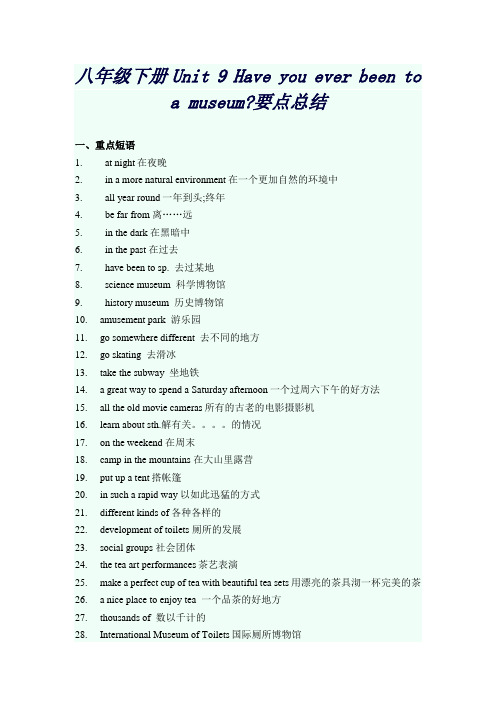八年级英语下册Unit9Haveyoueverbeentoamuseum语法专题_GrammarFocus习题课件新版人教新目标版
- 格式:ppt
- 大小:2.12 MB
- 文档页数:13

1. 单元重点短语归纳:2. Have you ever been to a science museum 你曾经去过科学博物馆吗【重点】【辨析】have/has been to;have / has gone to ;have/ has been in;(1). have/ has been to 表示“某人曾经去过某地”强调现在已经回来了,不在那里了。
.: We have been to Qingdao. 我们去过青岛。
(现在不在青岛)(2). have gone to表示“某人到某地去了”,强调现在还没有回来,可能在那里或途中。
.: They have gone to Sydney. 他们去悉尼了。
(现在在悉尼或途中)(3). have been in +地点:表示“某人在某地待了很长时间”,常与时间段搭配。
.: I have been in Nanchang for three years. 我在南昌待了3年了。
How long have you been in China 你在中国待了多长时间3. 一般过去时与现在完成时的用法比较【重点】&【难点】(1). 一般过去时表示过去某个时间发生的事、存在的状态或经常发生的动作。
说话的侧重点只是陈述一件过去的事情,不强调对现在产生的影响。
.: He visited Guilin in 1998. 在1998年他参观过桂林。
(只说明去桂林的时间)(2). 现在完成时表示动作发生在过去,对现在造成了影响或产生了结果。
不能与确定的过去时间状语连用。
.: Jill has bought a new computer. 吉尔买了一台新电脑。
I have taught here for fifteen years. 我在这儿教学已经15年了。
I have seen the film. 我看过这部电影。
(我了解这部电影的内容)I saw the film last week. 我上周看了这部电影。

Unit 9Have you ever been to a museum?1.encourage及物动词,意为“鼓励”,encourage sb. to do sth. 鼓励某人做某事,encourage sb. in sth.在某方面鼓励某人。
如:①My father encouraged me to take part in the sports meeting.父亲鼓励我参加运动会。
②Her parents encouraged her in her studies.父母鼓励她学习。
2.quarter四分之一;一刻钟three quarters四分之三;三刻钟①I've got to go in a quarter of an hour.一刻钟以后我就得走了。
②Three quarters of Chinese are farmers.四分之三的中国人是农民。
3.hear of 听说(1)hear of意为“听说”,相当于hear about。
如:①I have never heard about/of such a man.我从未听说过这样一个人。
②I've just heard of/about his illness.我刚听说他生病了。
(2)hear about/of sb. doing sth.意为“听说某人做某事”。
如:I've never heard of anyone doing a thing like that.我从未听说有人干过那种事。
4.on the one hand... on the other hand...一方面……另一方面……On the one hand, she taught English, and on the other hand, she learned。

Unit 9 Have you ever been to a museum?Section A(1a-2d)知识点一have/has been to去过某地Have you ever been to a science museum?你曾经去过自然博物馆吗?have/has been to意为“曾经去过某地”,但现在已不在那里了。
I have never been to Kunming before.我以前从没去过昆明。
My father has been to Hong Kong many times.我爸爸去过香港很多次。
1.have/has gone to意为“去了某地”,说话时该人不在现场,主语为第三人称。
—May I speak to Mr.Smith?——我可以和史密斯先生通电话吗?—Sorry,he has gone to China.——抱歉,他去英国了。
2.have been in意为“在某地”,表示在某地待了多少时间,常与表示一段时间的状语连用。
They have been in New York for five weeks.他们在纽约五周了。
知识点二反意疑问句It’s really interesting,isn’t it?它真的很有趣,不是吗?这是一个反意疑问句。
反意疑问句是由“陈述句 +附加疑问句”构成,遵循“前肯后否,前否后肯”原则。
此问句可用yes或no来回答。
附加反意疑问部分的主语要用代词,并与陈述部分主语一致,谓语动词在人称、数和时态上也要与陈述部分一致。
Linda won the speaking competition,didn’t she?琳达赢了演讲比赛,是吗?【温馨提示】1.含有never,hardly,seldom等的句子为否定句,反问部分用肯定形式。
2.反义疑问句的回答要“据实回答”,即事实是肯定的,就做肯定回答;事实是否定的,就做否定回答。
—Mary comes from England,doesn’t she?——玛丽来自英国,是吗?—No,she doesn’t.She is from the UAS.——不,不是。

Unit9 Have you ever been to a museum?一、重点词汇及拓展1. amusement n. 娱乐;游戏e.g. The old ladies played the games just for amusement.老太太们玩这个游戏只是为了取乐。
amuse v. 消遣,逗笑;使开心,使愉快amusing adj. 有趣的,好玩的,好笑的amused adj. 被逗乐的;感到好笑的2.amusement park 游乐场e.g. The amusement park is open from May through October.游乐园从五月到十月开放。
3.somewhere adv. 在何处;到某处pron. 某个地方e.g. Maybe the keys are somewhere in the dining room.也许钥匙在餐厅某个地方。
I need to find somewhere to stay tonight.我得找到今晚要住的地方。
4.camera n.照相机;摄影机;摄像机e.g. I heard your parents bought you a cameras as a gift.我听说你的父母亲给你买了一台照相机作为礼物。
5.invention n.发明;发明物e.g. Do you think mobile phone is a great invention?你认为手机是一个伟大的发明吗?6.invent v.发明;创造inventor n.发明家invention n.发明;发明物e.g. As we all know that Edison invented light bulb.我们都知道爱迪生发明了灯泡。
7. unbelievable adj. 难以置信的;不真实的unbelievably adv. 难以置信地;不真实地unbelievably bad/good 坏得/好得令人难以置信incredible adj. 难以置信的e.g. I still find this story both fascinating and unbelievable.我仍然觉得这个故事非常有趣和难以置信。

Unit 9 Have you ever been to a museum?课文重难点讲解1.—Have you ever been to a science museum?你曾经去过科学博物馆吗?⑴have/ has been to + 地名“曾经去过某地” , 现在已经回到原地。
⑵have gone to “已经去某地了” ,说话时该人不在现场。
⑶ have been in +地点待在某地,常与时间段搭配。
I have been in Shanghai for three years.2. Me neither我也没有。
【解析】在英语中,表示“也”的知识归纳如下:主语+ neitherA. 否定句中的“也” neither +助动词/be + 主语完整的否定句后加either,但要加逗号隔开。
3. Let’s go to one tomorrow. 咱们明天去一个看看吧!【解析】⑴ Let’s 中的us 包括对方,反意疑问句用shall weLet’s go and listen to the music, ____________?⑵ Let us 不包括对方, 反意疑问句用will youLet us wait for you in the reading room, ___________?⑶ Let sb. do sth 让某人做某事(sb.应用人称代词的宾格形式)5. It’s really interesting, isn’t it?【反意疑问句】6. 【解析1】invent v 发明→inventor n 发明家→ invention n 发明invent 发明指事物从无到有(客观上没有)discover 发现强调事物本身存在,只不过从“未知”到“已知”(客观上以前存在)【解析2】lead →led→ led v引导,引诱→ leader n领导人【拓展】lead to sth 导致……lead sb. to sw 引导某人去某地lead sb. to do sth 引导某人干某事7. take the/a +交通工具+to +地点“乘坐……” (放于句中) 动词短语在句中做谓语take the subway 乘地铁take the train 乘火车take the bus 乘公共汽车take the taxi 打的8. 【短语】:put away 把…收起来put on 穿上put up 张贴,put out 熄灭put…into… 把……放进put down 放下【解析】information信息;资料【辨析】information/message/ news⑴information指电视、电脑或其它杂志等获得的信息,为不可数名词;a piece of information 一条信息You can get much information on the Internet⑵. message“消息、口信、电报” 指书面、口头、无线电等传来的信息,为可数名词;I’ll leave a message for her. 我将为她留个口信。

八年级下册Unit 9 Have you ever been toa museum?要点总结一、重点短语1. at night在夜晚2. in a more natural environment在一个更加自然的环境中3. all year round一年到头;终年4. be far from 离……远5. in the dark 在黑暗中6. in the past 在过去7. have been to sp. 去过某地8. science museum 科学博物馆9. history museum 历史博物馆10. amusement park 游乐园11. go somewhere different 去不同的地方12. go skating 去滑冰13. take the subway 坐地铁14. a great way to spend a Saturday afternoon一个过周六下午的好方法15. all the old movie cameras所有的古老的电影摄影机16. learn about sth.解有关。
的情况17. on the weekend 在周末18. camp in the mountains 在大山里露营19. put up a tent搭帐篷20. in such a rapid way 以如此迅猛的方式21. different kinds of各种各样的22. development of toilets 厕所的发展23. social groups 社会团体24. the tea art performances茶艺表演25. make a perfect cup of tea with beautiful tea sets用漂亮的茶具沏一杯完美的茶26. a nice place to enjoy tea 一个品茶的好地方27. thousands of 数以千计的28. International Museum of Toilets国际厕所博物馆29. the Terracotta Army 兵马俑30. Southeast Asia东南亚31. Night Safari 夜间动物园32. three quarters 四分之三33. an English-speaking country一个讲英语的国家34. have problem doing sth. 做某事很困难35. during the daytime在白天36. a couple of times 好几次37. right now 现在;目前38. an amusement park with a special theme一个有特别的主题的游乐园39. walk around the park 在公园里到处走40. hear of 听说41. take a ride兜风42. another province另一个省43. the Bird’s Nest鸟巢44. encourage sb. to do sth.鼓励某人做某事45. on the one hand... on the other hand.一方面,另一方面Section B重点短语归纳thousands of 数以千计的,许许多多的;three quarters四分之三;close to贴近,邻近;on the one hand...on the other hand一方面......另一方面......;take a holiday度假; whether...or...无论/不管?还是?;practice doing sth.练习做某事;at night在夜晚;have problem doing sth.做某事遇到困难;be asleep睡着(表示状态);of course当然; be far from远离;English-speaking country说英语的国家;二 ,重要知识点(1)重要句型1 Have you ever been to... ?Have you ever been to a science museum?你曾经去过科学博物馆吗?2. Let’s.。
Unit 9 Have you ever been to a museum一、必背短语【教材内容解析】Section A1.Me neither (P. 65)me neither意为“我也不……”,表示前者的否定情况也适用于我,反义词为me too。
---Susan can’t play the piano at all.---Me neither.2.Let’s go to one tomorrow. (P. 65)one是不定代词,用来代替前面出现过的可数名词单数,如果指代名词复数,用ones。
Here are my books. Which one do you want to read?---I don’t like these dresses.---How about those ones over there.3.Let’s go somewhere different today. (P. 65)somewhere用作副词,表示“在某处、到某处”,常用于肯定句中,在否定句和疑问句中用anywhere。
It’s cold here. Let’s go somewhere else.Did you go anywhere last Sunday?4.They are going to take the subway. (P. 66)take the subway意为“乘地铁”,take用作动词,可以表示“乘、坐(车、船等)”。
We take the subway to work every day.5.It’s a great way to spend a Saturday afternoon. (P. 66)(1) way表示“方法”时,后常接动词不定式或者of doing作定语。
Can you think out a way to open the door/of opening the door?(2) spend的用法① sb. spend+时间/金钱+on sth. “在某事上花费多长时间或者多少钱”The man spent the whole day on his speech.The family spent 10,000 dollars on their trip.② sb. spend+时间+(in) doing sth. “花费多长时间做某事”The boy has spent two hours playing the computer games.【拓展】辨析spend, pay, take和cost6.We put up a tent and cooked outside. (P. 66)put up意为“搭建”,还可以表示“举起、张贴”。
(名师选题)部编版八年级英语下册Unit9Haveyoueverbeentoamuseum高频考点知识梳理单选题1、He looks worried. I wonder _________ he has already known about the result. A.whereB.whetherC.why答案:B句意:他看起来很担心。
我想知道是否他已经知道结果了。
考查宾语从句。
where哪里;whether是否;why为什么。
动词“wonder”后是宾语从句,根据“he has already known about the result”可知表达“想知道是否他已经知道结果了”用引导词“whether”引导从句。
故选B。
2、—Do you still remember our primary school teacher, Mrs. Liu?—Yes. She always encouraged us and gave us support _________ we met difficulties. A.wheneverB.whateverC.howeverD.whoever答案:A句意:——你还记得我们小学的刘老师吗?——是的,无论何时我们遇到困难,她总是鼓励我们,给我们支持。
考查连词辨析。
whenever无论何时;whatever无论什么;however无论如何;whoever无论谁。
根据“we met difficulties”可知,主句主谓宾成分齐全,因此本句是让步状语从句,结合语境,应是无论何时我们遇到困难,故选A。
3、—Did you go _________ last summer holiday?—Yes. I went to Shanghai Disney.A.somewhere specialB.anywhere specialC.special somewhereD.special anywhere答案:B句意:——去年暑假你去了什么特别的地方吗?——是的。
八下Unit 9 Have you ever been to a museum? 知识点复习一、单词过关。
娱乐在某处照相机发明n.发明v.难以置信的进步迅速的不寻常的厕所鼓励社会的和平的表演完美的它自己收集德国的主题短途旅程省份一千安全的仅仅害怕是否日本的印度的狐狸赤道无论何时春天主要地地点二、词语部分。
了解关于做……的好方法搭帐篷在未来能够做某事不同种类的鼓励某人做某事几次成千上万的一方面另一方面说英语的国家做某事有困难在白天醒来全年接近选择做某事去不同的地方导致四分之三三、重点语法。
现在完成时1、例句:①Have you/ we/ they ever been to s science museum ? Yes,...have./No,…haven’t.①Has he/she/it ever Treasure Island ? Yes,….has.//No,…hasn’t.①I have been to the art museum many times.①I have never been to a water park.2、现在完成时标志词:3、写出过去分词。
1.be2.invent3.see4.bear5.beat6.become7.begin8.blow9.break10.bring11.build12.burn13.buy14.catch15.choose4、have been to到过某处(现在已回来),通常与ever、never、次数等连用have gone to 到某处去了(现在还没有回来),通常暗示不在场。
have been in/at 在某处呆了多久,通常与since,for,how long连用。
He London and knows much about it.He didn’t travel with us. He to his hometown.He this Dongguan for five years.5、肯定句用So开头,否定句用Neither开头。